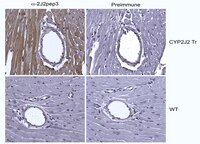ABS1605 Sigma-AldrichAnti-Cytochrome p450 2J Family Antibody
Anti-Cytochrome p450 2J Family Antibody is an antibody against Cytochrome p450 2J Family for use in Western Blotting
, Immunohistochemistry (Paraffin).
More>>
Anti-Cytochrome p450 2J Family Antibody is an antibody against Cytochrome p450 2J Family for use in Western Blotting, Immunohistochemistry (Paraffin). Less<<
Recommended Products
Overview
| Replacement Information |
|---|
Key Specifications Table
| Species Reactivity | Key Applications | Host | Format | Antibody Type |
|---|---|---|---|---|
| R, M, H | WB, IH(P) | Rb | Serum | Polyclonal Antibody |
| References |
|---|
| Product Information | |
|---|---|
| Format | Serum |
| Presentation | Rabbit polyclonal serum with 0.05% sodium azide. |
| Quality Level | MQ100 |
| Physicochemical Information |
|---|
| Dimensions |
|---|
| Materials Information |
|---|
| Toxicological Information |
|---|
| Safety Information according to GHS |
|---|
| Safety Information |
|---|
| Packaging Information | |
|---|---|
| Material Size | 100 µL |
| Transport Information |
|---|
| Supplemental Information |
|---|
| Specifications |
|---|
| Global Trade Item Number | |
|---|---|
| Catalog Number | GTIN |
| ABS1605 | 04055977312874 |
Documentation
Anti-Cytochrome p450 2J Family Antibody Certificates of Analysis
| Title | Lot Number |
|---|---|
| Anti-Cytochrome p450 2J Family - 3759029 | 3759029 |
| Anti-Cytochrome p450 2J Family -Q2640161 | Q2640161 |









